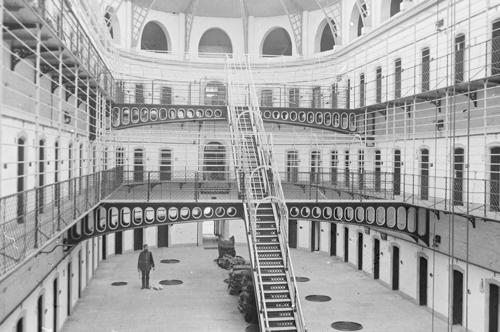Efforts escalate to end female hunger strike as two prisoners are released
Dublin, 27 April 1913 - Two women who had been on hunger strike in Kilmainham Jail were released yesterday following medical evidence that they were in danger of dying. The women have been named as Miss Annie O’Neill of Enniscorthy and Miss Nellie Ryan of Tomcoole, Co. Wexford.
In a statement issued by the Government Publicity Department, the release was confirmed following a discussion in the Dáil during which Dr. Patrick McCartan declared his intention to move a motion next week that stated that ‘in the opinion of an Dáil, any prisoners who decide, after the passing of this resolution, to go on hunger-strike, in order to secure their release, should be allowed to take the full consequence of their act.’
This an amended wording from a motion that Dr. McCartan moved last
week where, in view of recent peace developments, he proposed that
it ‘would be in the national interest to release the
prisoners now in a precarious condition as a result of hunger
strike.’
Dr. McCartan withdrew the original motion in the Dáil on
April 25th after consulting with Ministers towards the end of the
sitting. However, his newly worded motion drew opposition from,
amongst others, the Labour leader, Mr. Thomas Johnson, who urged
it to be withdrawn.
In a contribution to the same debate, Mr. Sean Milroy TD said that the government needed to stop trying to look both ways when it came to such important issues. ‘There are a few things in Ireland that mean everything’, he argued.
‘There is the sanctity of life and property and the recognition of legitimate authority. If legitimate authority is flouted with impunity, if it goes down into chaos and anarchy, everything that we hold dear goes down along with it....if the hunger strike is going to be used as a weapon to deny and destroy the fundamental basis not only of political but of moral authority within the country, then it is a weapon that will have to be met and resisted. I do not want to bolt or bar the doors of the cells of these ladies. I wish every one of them could go free from their cells to-night, and I believe the Minister for Home Affairs will confirm what I say, namely, that each and every one of them could walk free from their cells to-night if they would give the necessary undertaking that they would not be participants against the security of the State.’
The plight of women on hunger strike in Irish prisons has elicited much concern in recent days from local authorities in Cork and Limerick.
The Limerick County Council, for instance has also called on the Government to release local TD, Mrs. Kathleen O’Callaghan, one of four women still on hunger strike in Kilmainham Jail.. A resolution adopted by Council declared that Mrs O’Callaghan’s imprisonment is ‘not calculated to serve any useful purpose, and her release would give satisfaction not only to this Council but to the people of Limerick generally. ’
It is understood that Mrs O’Callaghan, despite complaining of pains and exhaustion, has refused the services of the prison doctor. So too has Miss MacSwiney, who is reported to be weak and prone to faintness. The two other female hunger strikers in Kilmainham - Madame MacBride and Miss Costello are said to be in a serious condition.
[Editor's note: This is an article from Century Ireland, a fortnightly online newspaper, written from the perspective of a journalist 100 years ago, based on news reports of the time.]





















